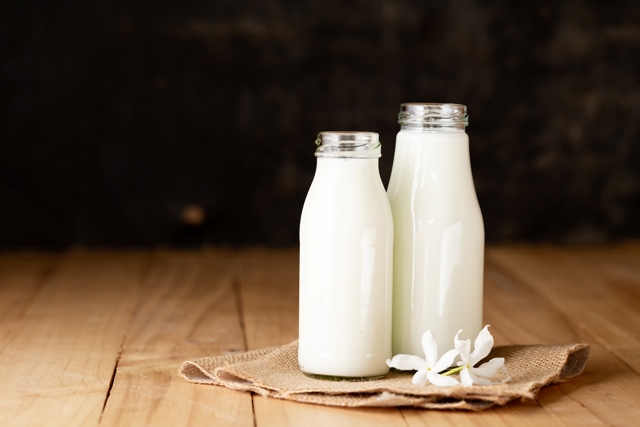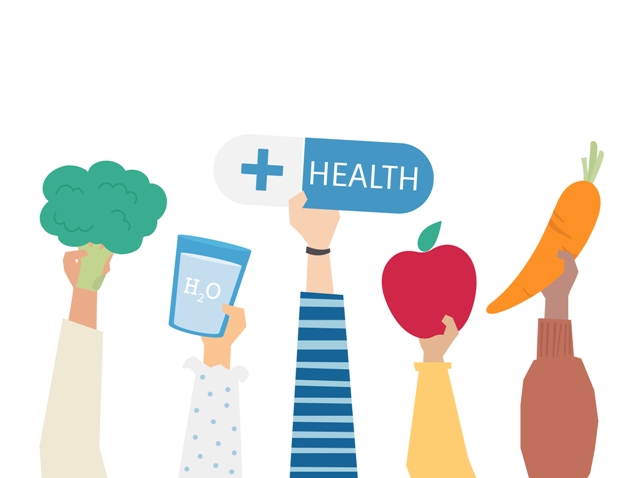Water is an essential component of body and plays various important roles. The most important role of water is recognized as hydration. Proper hydration is very much important for health because it helps to protect the body from the detrimental effects of dehydration and it has seen that water alone does not hydrate the body properly thus it is better to consume water along with several hydrating foods and drinks
This article will discuss about top 28 hydrating foods –
Watermelon
It contains about 91% of water and it also contains various important trace elements like potassium, copper zinc etc. Its consumption is very much helpful especially in summer for replacing the losses of water and electrolytes that have occurred through heavy sweating
Soy milk
It is a milk like drink and generally prepared by mixing soybean and water. It contains about 90% water that helps in hydration. It is also composed of several important nutrients
Skim milk
Skim milk is considered as low fat milk and it has seen that consumption of skim milk helps an individual to stay hydrated after heavy workout compared to water or sport drinks. It contains about 90 to 91% of water. Its consumption plays significant role in replacing the loss of water and electrolytes occurred after strenuous exercise. It is also considered as good source of protein, calcium, phosphorus and Vitamin D


Plain Yogurt
It is composed of about 88% of water thus plays imperative role in hydrating the body. It is also packed with various important nutrients like proteins, vitamins, minerals that especially help in promoting immune health, skeletal health, muscular health and cardiac health
Cottage Cheese
It is one of the most important nutrient dense dairy products, which has hydrating properties. It contains about 80% of water and also composed of proteins, healthy fats, vitamins and minerals
Cucumber
Cucumber is an important hydrating food and composed of about 95% of water. Apart from its water content it provides desirable amount of potassium, magnesium and Vitamin K. It contains significant amount of fibre as well that plays various imperative role in body. Cucumber is also consisting of a special nutrient named cucurbitacins that exerts potent hypoglycemic activity
Tomatoes
Tomatoes contain about 92 to 94% of water thus it is considered as an important hydrating food. It also contains various important micronutrients like potassium, Vitamin C, Vitamin A, Vitamin K and Vitamin B9. It contains lycopene as well that exhibit strong antioxidant activities that protect the body from the detrimental effects of free radicals

Romaine lettuce
It is consisting of 90 to 93% of water thus its consumption is thought to be very much helpful for maintaining a healthy water balance in body. It is also loaded with fibre and various imperative micronutrients like Vitamin C, Vitamin A, Vitamin K, calcium phosphorus, magnesium, which are responsible for a range of nutraceutical activities
Iceberg lettuce
Consumption of this crunchy and green variety of lettuce is also associated with hydrating the body. It contains about 94 to 96% of water. It also contributes fibre, zinc, potassium, Vitamin A and Vitamin K
Bell Peppers
It is an important nutritious vegetable that offers numerous health benefits. It contains about 90% of water and plays vital role in preventing dehydration. It is also composed of vitamins, minerals and phytonutrients that ultimately help to protect the body from oxidative and inflammatory damages
Cabbage
It is an important cruciferous vegetable and packed with various important micronutrients, phytonutrients and fibres, that play imperative role in promoting overall health status. It is also considered as a perishable food as it contains about 92% of water and helps in hydrating the body

Cauliflower

It is another healthy vegetable that exerts hydrating properties. It contains about 92% of water. It also helps in cleansing the body by promoting toxin elimination
Celery
This light green coloured vegetable contains about 95% of water and helps in hydration. It contains various important trace elements as well
Spinach
It is another important hydrating vegetable that contains about 90% of water. It also contains several other important nutrients that play vital role in nourishing the body
Zucchini
Water content of zucchini is about 93%. It is also rich in potassium, magnesium, fibre, manganese, Vitamin A, C and K
Cantaloupe
It is also known as muskmelon. It contains about 90% of water. It also contains numerous trace elements. Its consumption is very much effective for maintaining the balance of water and electrolyte in body. It is also rich in Vitamin C and Vitamin A
Peaches
It is considered as one of the most important nutrient dense, hydrating food. It contains about 86 to 89% of water. It also contains various imperative nutrients that show numerous health benefits. It is loaded with fibre too and contributes lesser amount of calories on its oxidation thus its consumption is very effective for proper weight management as it is filling as well as low in calorie

Strawberry
It contains about 90 to 91% of water. Its consumption significantly improves hydration status of body and it can be easily incorporated into diet. It can be blended in smoothie, it can also be consumed with salads, custard or it can be consumed alone as well. It also contains significant amount of micronutrients and phyrtonutrients that help to exert antioxidant activity, anti-inflammatory activity, anti-carcinogenic activity, neuro-protective activity, cardio-protective activity, hypolipidemic activity and hypoglycemic activity
Kale
It is a nutritious vegetable contains about 90% of water and also contains high amount of vitamins, minerals, fibres and phytonutrients, which are responsible for exerting various nutraceutical activities apart from hydrating activities
Broccoli
Though broccoli is not the first food, which comes to mind when individual think of hydrating foods but it also play vital role in hydrating the body as it contains almost 90% of water

Orange
It is an important citrus fruit that contains about 86 to 87% of water and also rich in potassium, magnesium, copper, selenium, Vitamin B complex and Vitamin C
Grapefruit
It contains about 88% of water and also rich in micronutrients, phytonutrients and trace elements, which plays vital role in replenishing the losses of water and electrolyte occurred in body due to heavy sweating or diarrhoea or vomiting

Carrot
It contains various important nutrients that play vital role in improving overall health status whereas it also composed of 88% of water, which helps in hydration
Apple
It also contains 86% of water and considered as a good source of Vitamin C, fibre and antioxidants
Pineapple
It is another perishable fruit contains about 85% of water and also loaded with B vitamins, Vitamin C, magnesium, manganese and potassium. It is very effective for preventing dehydration, bone disorders and chronic inflammatory diseases
Soups and broths
These are extremely nutritious and have the potential to be hydrating as well. It not only helps to meet the need of water but also provides various essential nutrients to the body that play vital role in promoting overall nutritional status of an individual
Honeydew melon
It contains about 90% of water and helps to protect the body from the harmful effects of dehydration. It is also rich in Vitamin C and potassium
Coconut water
It is a healthy beverage and contains about 95% of water. Whereas it is also rich in trace elements like sodium, potassium, chlorine etc thus its consumption is considered as a healthy choice for maintaining normal fluid and electrolyte balance in body

Individual who want to hydrate themselves properly should consume enough water with above stated hydrating foods.

Source:
CHARGE, T., 2019. Mythbusting: Hydration.
Daisy, S., 2020. Healthy food for balancing hydration during sport.
Goldschmidt, V., Why Is Hydration So Important?.
Johal, R.K., 2020. The Role of Fruits and Vegetables in Hydration of 3-13 y Old Children.
Messineo, J., 10 Summer Foods to Help You Beat the Heat.
Pegoretti, C., Antunes, A.E.C., de Barros Manchado-Gobatto, F. and Capitani, C.D., 2015. Milk: an alternative beverage for hydration?. Food and Nutrition Sciences, 6(06), p.547.
Sharp, R.L., 2007. Role of whole foods in promoting hydration after exercise in humans. Journal of the American College of Nutrition, 26(sup5), pp.592S-596S.


